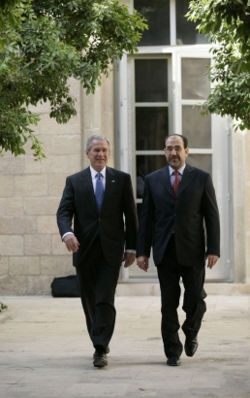Nouri al-Maliki: Difference between revisions
imported>Howard C. Berkowitz No edit summary |
imported>Howard C. Berkowitz No edit summary |
||
| Line 1: | Line 1: | ||
{{subpages}} | {{subpages}} | ||
[[Image:20060613 g0i3795-820v.jpg|thumb|left|250px|Nouri al-Maliki and [[George W. Bush]]]] | |||
'''Nouri al-Makiki''' (1950-) (also transliterated al-Malaki) is a [[Shi'ite]] who is [[Prime Minister]] of [[Iraq]]. He is sometimes called Jawad, which was his pseudonym while being hunted by the security forces of [[Saddam Hussein]]. He is head of the [[Islamic Dawa Party]]. His government, along with [[Jalal Talabani]] as President, succeeded the [[Iraqi Transitional Government]] and now controls Iraq as U.S. forces leave. | '''Nouri al-Makiki''' (1950-) (also transliterated al-Malaki) is a [[Shi'ite]] who is [[Prime Minister]] of [[Iraq]]. He is sometimes called Jawad, which was his pseudonym while being hunted by the security forces of [[Saddam Hussein]]. He is head of the [[Islamic Dawa Party]]. His government, along with [[Jalal Talabani]] as President, succeeded the [[Iraqi Transitional Government]] and now controls Iraq as U.S. forces leave. | ||
Saddam forced the Dawa party leadership in 1980, when they took refuge in Syria. [[Ibrahim Jaafari]] was then the party leader, and became interim prime minister in the transitional government after Saddam was ousted. Jaafari, however, was unacceptable to Kurdish and Sunni blocs, and Maliki was an acceptable alternative when a Shi'te coalition won a majority in 2005. | Saddam forced the Dawa party leadership into exile in 1980, when they took refuge in Syria. [[Ibrahim Jaafari]] was then the party leader, and became interim prime minister in the transitional government after Saddam was ousted. Jaafari, however, was unacceptable to Kurdish and Sunni blocs, and Maliki was an acceptable alternative when a Shi'te coalition won a majority in 2005. | ||
It was suggested he was selected as weak and without a strong grassroots power base, but has been consolidating power with his Shi'a opposition and allies, Americans, and Iranians. "Unlike other opposition figures he [Maliki] didn't build wealth, he is very honest and very organised," The cleric said his style is implicit in his party: "The Dawa party in its methods and way of working is very similar to the Communist party. They don't trust anyone. They surround themselves with people they know. Maliki, like all of us, is the product of exile. They have suffered for so long in exile so now they trust no one." | |||
<ref name=Guardian2009-04-30>{{citation | |||
| url = http://www.guardian.co.uk/world/2009/apr/30/iraqi-prime-minister-maliki | |||
| title = Six years after Saddam Hussein, Nouri al-Maliki tightens his grip on Iraq | |||
| journal = The Guardian | date = 30 April 2009 | |||
| author = Ghaith Abdul-Ahad }}</ref> | |||
==Authority== | |||
The Iraqi Prime Minister has substantial authority without legislative approval, and is building security forces. He has established the Iraqi National Intelligence Service (INSI), under his direct control, and some Iraqis consider too close to the U.S. One intelligence officer told [[The Guardian]], "We have our own eyes and follow what they are doing there...Maliki is running a dictatorship - everything is run by his office and advisers, he is surrounded by his party and clan members. They form a tight knot that is running Iraq now. He is not building a country, he is building a state for his own party and his own people." <ref name=Guardian2009-04-30 /> | |||
==References== | |||
{{reflist}} | |||
Revision as of 17:55, 2 July 2009

Nouri al-Makiki (1950-) (also transliterated al-Malaki) is a Shi'ite who is Prime Minister of Iraq. He is sometimes called Jawad, which was his pseudonym while being hunted by the security forces of Saddam Hussein. He is head of the Islamic Dawa Party. His government, along with Jalal Talabani as President, succeeded the Iraqi Transitional Government and now controls Iraq as U.S. forces leave.
Saddam forced the Dawa party leadership into exile in 1980, when they took refuge in Syria. Ibrahim Jaafari was then the party leader, and became interim prime minister in the transitional government after Saddam was ousted. Jaafari, however, was unacceptable to Kurdish and Sunni blocs, and Maliki was an acceptable alternative when a Shi'te coalition won a majority in 2005.
It was suggested he was selected as weak and without a strong grassroots power base, but has been consolidating power with his Shi'a opposition and allies, Americans, and Iranians. "Unlike other opposition figures he [Maliki] didn't build wealth, he is very honest and very organised," The cleric said his style is implicit in his party: "The Dawa party in its methods and way of working is very similar to the Communist party. They don't trust anyone. They surround themselves with people they know. Maliki, like all of us, is the product of exile. They have suffered for so long in exile so now they trust no one." [1]
Authority
The Iraqi Prime Minister has substantial authority without legislative approval, and is building security forces. He has established the Iraqi National Intelligence Service (INSI), under his direct control, and some Iraqis consider too close to the U.S. One intelligence officer told The Guardian, "We have our own eyes and follow what they are doing there...Maliki is running a dictatorship - everything is run by his office and advisers, he is surrounded by his party and clan members. They form a tight knot that is running Iraq now. He is not building a country, he is building a state for his own party and his own people." [1]
References
- ↑ 1.0 1.1 Ghaith Abdul-Ahad (30 April 2009), "Six years after Saddam Hussein, Nouri al-Maliki tightens his grip on Iraq", The Guardian